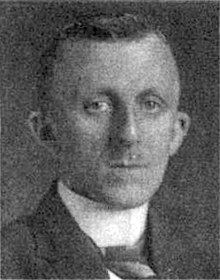Hans Ellenbeck
Hans August Paul Ellenbeck (born July 16, 1889 in Krefeld , † January 27, 1959 in Strümp ) was a German politician ( DNVP ) and editor.
Life
Ellenbeck studied at the University of Tübingen , where he joined the Corps Borussia Tübingen , and at the University of Bonn . There he received his doctorate in 1911 with a dissertation on The Legend of the Origin of German Master Singing . He took part in the First World War. In 1919 he became city councilor of the DNVP in Düsseldorf. In addition, he was chairman of the Düsseldorf branch of the DNVP and at times the cultural policy spokesman for his party. From 1927 to 1945 he was senior director of studies at what was then the Hindenburg School in Düsseldorf.
Ellenbeck was a member of the Reichstag from 1924 to 1928 as a member of the German National People's Party (DNVP) .
In 1939 he became the commander of an infantry unit. In 1940 he was transferred to the Wehrmacht High Command in West Prussia in the department "Defense against enemy propaganda". He was editor in chief of the leaves messages for the troops and messages for the officer corps , of which the former in millions of copies weekly and the latter were placed fortnightly to the front.
From 1950 he was managing director of the Stifterverband der deutschen Industrie in Düsseldorf, which this year a. a. a right-wing extremist Deutsches Kulturwerk Europäische Geist (DKEG) of Herbert Böhme endowed with 100,000 Marks start-up aid.
In the Soviet occupation zone , Ellenbeck's writings Student, Volk und Staat (Ring-Verlag, Berlin 1926), The Responsibility of the German Officer (Detke, Leipzig 1941), The Company Commander (Detke, Leipzig 1942), The Officer as a leader in the fight against enemy were published Propaganda (1943) and storm bells over Germany (Detke, Leipzig 1943) placed on the list of literature to be discarded.
literature
- Ernst Klee : The dictionary of persons on the Third Reich . Who was what before and after 1945 . 2nd Edition. Fischer-Taschenbuch-Verlag, Frankfurt am Main 2007, ISBN 978-3-596-16048-8 .
- Erich Stockhorst: 5000 people. Who was what in the 3rd Reich? VMA-Verlag, Wiesbaden 1967; 2nd edition Arndt Kiel 1985.
Web links
- Literature by and about Hans Ellenbeck in the catalog of the German National Library
- Hans Ellenbeck in the database of members of the Reichstag
Individual evidence
- ↑ http://www.polunbi.de/bibliothek/1946-nslit-e.html
- ↑ http://www.polunbi.de/bibliothek/1947-nslit-e.html
- ↑ http://www.polunbi.de/bibliothek/1948-nslit-e.html
| personal data | |
|---|---|
| SURNAME | Ellenbeck, Hans |
| ALTERNATIVE NAMES | Ellenbeck, Hans August Paul (full name) |
| BRIEF DESCRIPTION | German politician (DNVP), MdR |
| DATE OF BIRTH | July 16, 1889 |
| PLACE OF BIRTH | Krefeld |
| DATE OF DEATH | January 27, 1959 |
| Place of death | Stocking |
